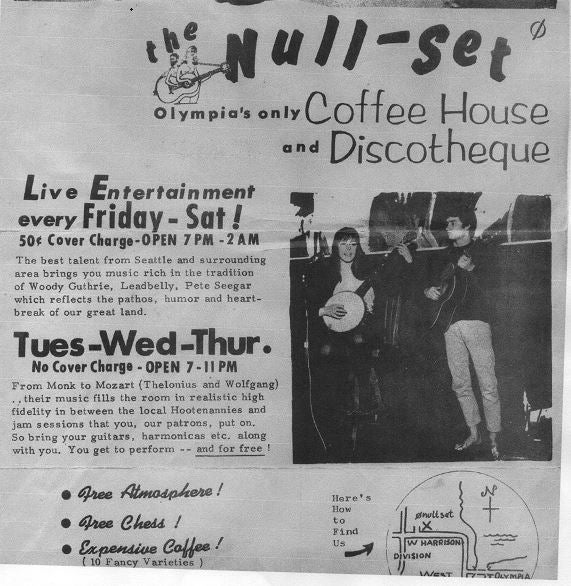|
Above: Lynne Hughes and Barefoot John play The Null Set, Olympia, WA, Sept. 1964
The Null Set! "I remember hanging there, going there just to go. It was so cool. There was nothing like it here in town." Thus is The Null Set remembered by long-time Olympia resident Wanda Hedrick. Wanda and her husband Worth were friends with the owners of Olympia's first coffee house, and also participated in the regular art shows hosted there. Worth is one of many local artists featured at Sunday afternoon art exhibitions. Bringing art to Olympia was one focus of The Null Set; their ambitious agenda included providing poetry, music and fancy coffee to the "small, conservative town of Olympia." The Null Set was the brainchild of two young Olympia couples with children, Patricia & Pete Holm, Bonnie Coate-Gillis & Bob Gillis. Patricia and Bob were teachers at local area schools who met studying at the University of Washington; Patricia majored in drama and Bob in art. Pete Holm grew up on a farm near Rochester, WA. After finishing college he strummed around the late '50s folk scene in Boston and Cambridge, MA, which begat Jim Kweskin, Joan Baez and Eric Von Schmidt, who all performed at the Club 47 coffee house. Bonnie Coate-Gillis grew up in rural Eastern Washington on a farm near the Columbia River. She was an accomplished painter who also designed her own clothes. Patricia Holm and her first husband traveled to San Francisco to experience the '50s poetry world at assorted coffeehouse venues there. All four of them (Pete, Patricia, Bob, Bonnie, Bob) hung around the Seattle coffee house scene that nurtured folk, blues and poetry in the '50s and '60s. Their shared experiences at coffeehouses around the country gave the four of them the idea to establish such an coffee emporium of their own. Opening in a former grocery store on Olympia's Westside during the summer of 1964, The Null Set continued through the summer of 1967. Along the way it provided coffee, tea and local baked goods along with blues, folk music, puppetry, mime and psychedelic light shows. One of their earliest musical events introduced Olympia to bluegrass music for the first time. Some radical shizzz. 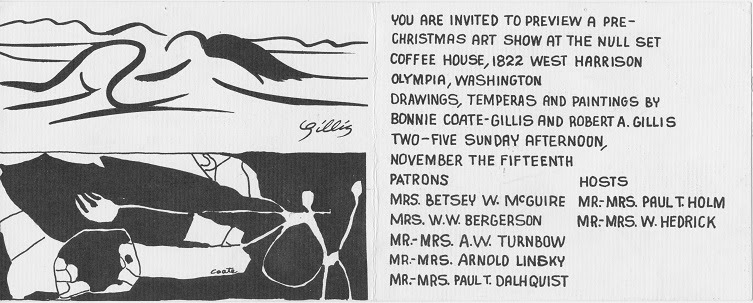 An invitation to the first art show at The Null Set, November, 1964 Olympia, Washington, 1964: it needed The Null Set. This was before the founding of The Evergreen State College, before Capital Mall, Interstate 5 was a disjointed collection of roadways that had only started taking shape a few years before, Lacey had yet to incorporate as a neighboring city; all of Olympia had a giant sign hanging over it that said "Hippies use the side door". Or would have, if anyone in Olympia had ever heard of hippies. The Null Set was located one block east of Harrison & Division, the western edge of Olympia - - - the edge of the world! Everything west of there was forests and farms. Harrison continued as the main highway west to Aberdeen and ocean beaches or north to Shelton and the Olympic Peninsula. The plan was to be located on a major thoroughfare and visible from the street with an attractive sign (painted in black & white by Bob) to draw people in. Play some chess, drink Italian soda, strum it up at the latest hootenanny. Sounds like the life. The Null Set Remembered is a snapshot of a local underground scene hewn from the wilderness, set down for folks to discover. Being the only place of its kind in the South Sound, it drew artists, participants and patrons from all over the area: Rochester, Centralia, Port Townsend, Aberdeen, Tacoma, even Eastern Washington. 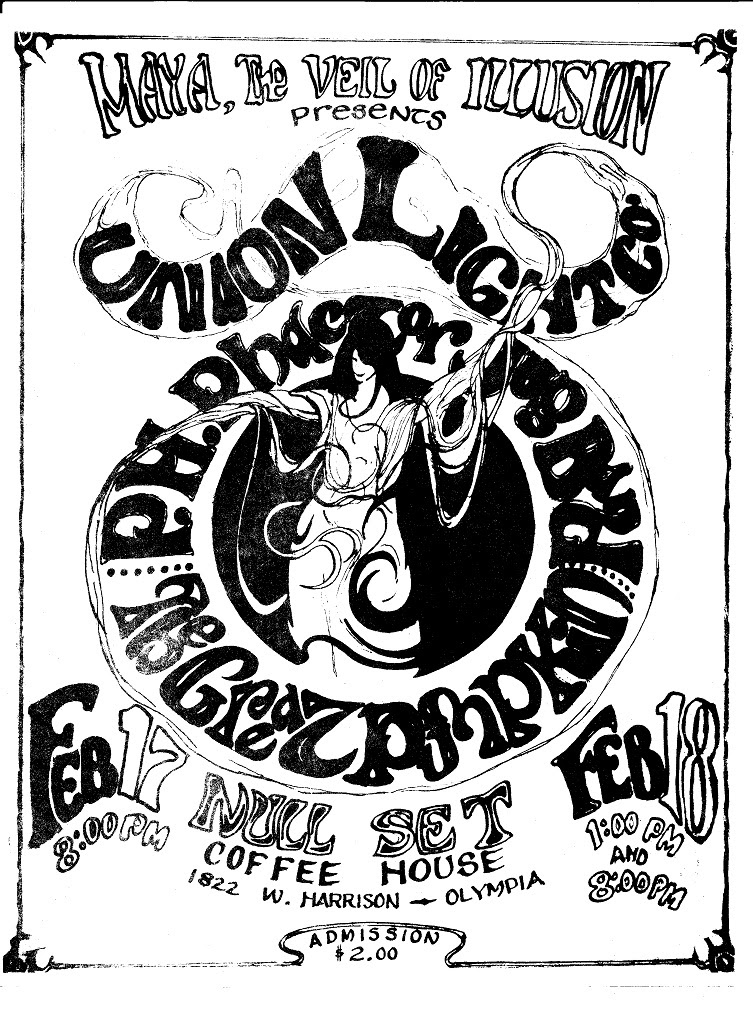 Union Light Co. provided Olympia's first psychedelic light show to accompany P.H. Phactor Jug Band and The Great Pumpkin, February, 1967 Poetry is a major common denominator between a varied set of folks who also shared left-leaning politics. The Null Set provided a place for these to reside, and thrive. Groups formed and met at The Null Set to oppose the war in Vietnam, and to organize support for civil rights workers in the American South, such as Thurston County Friends of the Mississippi Project. Being a venue for live music was a main reason for The Null Set's existence. This was a time when music was thought of in terms of songs rather than albums. Performers collected songs from widely diverse sources including country blues, ragtime, Tin Pan Alley, labor songs, spirituals, Broadway show tunes. Performers were drawn from Olympia and the surrounding area, plus traveling troubadours from as far away as Portland, Seattle and San Francisco. There was no public address system, nor was there a need for one as the room was small (intimate). The Null Set were proud they were always able to pay the performers, and gained a reputation as a good stop-over on the north-south projectory. Traveling musicians slept on the floor of the coffee house or the houses of generous spectators (some things never change). Reading The Null Set Remembered really brings this nascent musical scene to life. Author Patricia Holm interviews many of Olympia's early folk musicians who had no other public venue to share their music. The Null Set was a place for them to find each other. Prior to The Null Set the only venue for local blues and folk artists were private parties, and the occasional "folk music competition" like one sponsored by Yard Birds Family Shopping Center. One of the most popular combos to play The Null Set was P.H. Phactor Jug Band, who formed in Seattle (later moving to Portland). They played The Null Set approximately once a month, and individual members also performed solo sets (see above handbill featuring Barefoot John). P.H. Phactor Jug Band opened the door to many other traveling minstrels from the West Coast, San Francisco to Bellingham. P.H. Phactor Jug Band gained quite a following during their day, participating in San Francisco's famous Haight-Ashbury music scene. 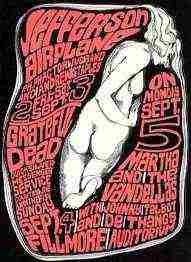 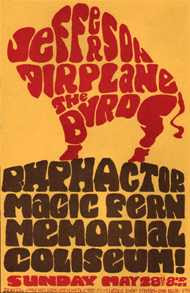 P.H. Phactor Jug Band, Fillmore, S.F., CA 1966 P.H.Phactor Jug Band, Memorial Coliseum, Portland, OR 1967 The Null Set made a valiant effort to maintain a creative and diverse community, but may have been a little ahead of it's time. As a business, The Null Set never did more than break even. Muses Wanda Hedrick, "It didn't last very long. Probably it wasn't making any money." However, three years is an eternity in terms of alternative performance spaces. Many venues that followed in its footsteps lasted a year or less. Reading about the various ways The Null Set scrambled to keep afloat is another fascinating and entertaining aspect of The Null Set Remembered. No one ever said it was going to be easy. But it sure sounds like a lot of fun.  The Null Set Remembered, a Memoir of a Coffee House by Patricia Holm is available now from The K Mail Order Dept. |
